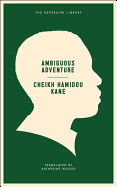
Praised by Chinua Achebe and Wole Soyinka but never before translated into English, this 1962 African classic opens in the Diallobé country of Senegal in colonial times. Eight-year-old Samba Diallo is pinched and gouged by a Koranic teacher while learning from the holy Book. Battling for his soul are the old schoolmaster who kneels in prayer 20 times a day and Samba's aunt, the six-foot-tall Most Royal Lady, who calls an assembly of the Diallobé to urge them to send their children to the school of the enemy who has defeated them.
Young Samba Diallo is facing an educational crisis: to cling to the old ways or go to the new foreign school to learn "how better to join wood to wood" and "the art of conquering without being in the right." The second half of the story finds Samba Diallo in Paris, wondering, "Is what one learns worth what one forgets?"
The writing style is formal, lyrical and occasionally elliptical, revealing information after the fact. Still, the story's philosophical concerns are nakedly human and timeless: How do you push away the anxiety of approaching death and get up in the morning to go to work? How do you make your working life into a prayer? Violating all stereotypes, these are African tribesmen who discuss Pascal and Descartes.
This dense little book has layers of cultural depths that Western eyes can't easily penetrate. There's a climactic murder for rather obtuse spiritual reasons and an inexplicable conversation in the last chapter between two unnamed characters who may be in the afterlife. Still, Ambiguous Adventure is hauntingly urgent, provocative and occasionally overpowering. --Nick DiMartino, Nick's Picks, University Book Store, Seattle

